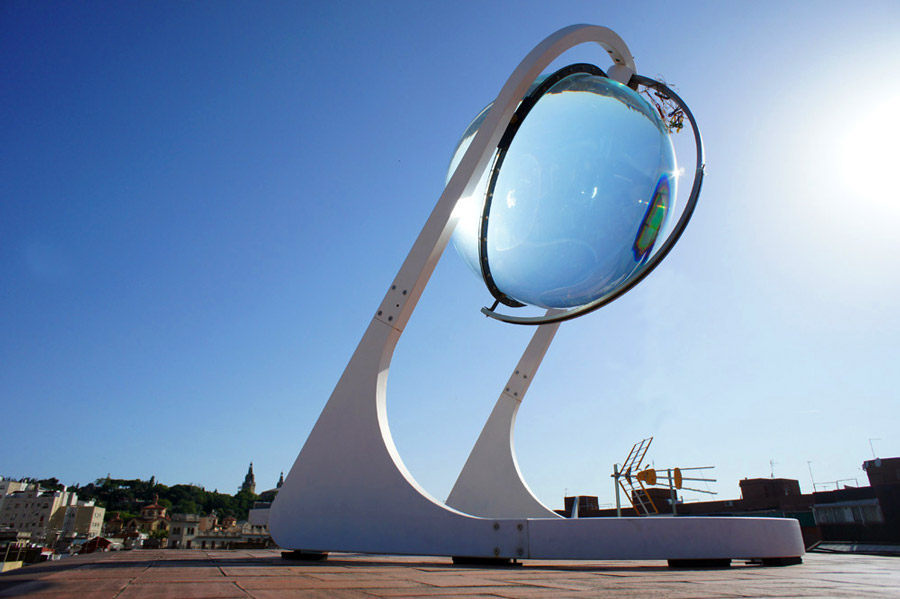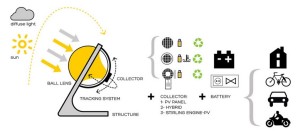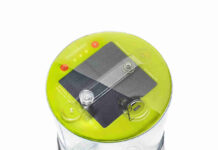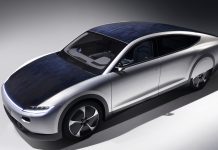
Rawlemon and Broessel had a spherical solar dream
According to its vision, the German architect Andre Broessel said that the future will be not only green, but transparent, and he brought a solution through it can “squeeze more juice out of the sun”. More than that, he had the idea to collect further the solar energy reflected by Moon during the night, in fact to squeeze also the Moon light.
He projected a spherical solar energy collector, a prototype called beta.ray. Its technology combines spherical geometry principles with a tracking system that use a smaller surface area of a conventional solar panel by yielding parameters.
It collects even low light energy and transforms it than into electricity, but most important is that harvest solar energy and thermal power, the same time. More than that, it is fully rotational and suitable to be placed on inclined surfaces, on top of buildings or other sunny places. With a little imagination many new usage can be found.
Solar energy collected more clever with beta.ray
The greatest sustainable source of energy on earth remains the sun. More than 80% of solar panels worldwide have a performance of 15% and when they are not tracked with the sun lose more than 70% of that solar energy.
The beta.ray use physical principle discovered by Archimedes which shows that when a crystal lens is exposed to the sun energy, it concentrates incoming (energy of) light to a focal point.
The design of the Rawlemon, its perfect geometry and the patented dual axis tracking system provides the optimum angle to better convert the sun light all day long, in fact travelling with the sun.
The first benefits of beta.ray
The immediate benefits of beta.ray which make the big difference when compare it to ordinary solar panel are the following:
– gains up to 95% more solar energy conversion using the solar tracking system in North European region;
– 15% more yield improvement by spherical lens concentration of solar energy;
– at least minimum 75% less solar panel surface necessary for conversion the solar energy;
– lowest carbon footprint;
– no weather impact and maximum 99% transparency.
Each type is built by an Acrylic Polymer ball lens filled with water. The one with 1.8 m diameter has inside 3055 liters of water and can supply 560 Watt (220W/square meter) electrical data and 890 Watt (350W/Square meter) thermal data, on average per day 3.4 KWh.
How the spherical solar energy collector works?

The immediate impact and usability should make us interested about it. It can be integrated by architects in different types of street design projects or ecological design. One of the immediate of Rawlemon products usages is an outdoor Mobile Stand Alone Power Generators Station.
The model KS1000-1800 station is designed for off grid conditions as well as to supplement buildings’ consumption of electricity and thermal circuits like hot water. It operates at efficiency levels of nearly 57% in hybrid mode and with few LEDs can illuminate its location.
Beta.ray 1.0-1.8 model comes with a hybrid collector that charge and stores solar energy and thermal energy. It can be used to supply electricity to electric bicycles, electric motorcycles, electric cars, building integration, electric devices.
“MicroTrack combine three products – a revolutionary concentrator photovoltaic, a full transparent ball lens screen with multimedia wall, and a breakthrough, micro dual-axis tracking unit assembled with Multi –Junction high efficiency solar cells – into one full building integrated photovoltaic module.”
This project is a challenge. My worried is about the worst scenario but they made tests and each model resist to a wind speed up to 120 m/s, so that should be all right.




What if they could set an array of these devices, that focus concentrated sunlight on a long length of copper pipe and pump air into one end of the pipe, so it becomes superheated and come out the other end like a blowtorch, to provide heat to pyrolysis chambers that heat wood and cellulose (corn nobs) to make gases without any air, that could be further processed into synthetic fuels. The same setup could be used to make BioChar crop fertilizer by superheating organic wastes inside of enclosed metal chambers without air, which would also sequester carbon into the soil, making a dent in global warming as well. EOJ